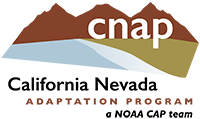THE ADAPTIVE MIND PROJECT
CALIFORNIA NEVADA ADAPTATION PROGRAM
Our mission is to build the psycho- social support infrastructure to take care of those who take care of us and lead us through difficult change.
Our Vision: Professionals and community leaders everywhere addressing natural hazards have the psychological skills, capacities, and the peer and institutional support, to honestly, compassionately and effectively face the challenges of a rapidly, continually, traumatically changing world and skillfully assist the necessary healing transformative shifts to a more livable world.
WHY THIS PROJECT? WHY NOW?
-
Emerging research and experience with health impacts of extreme weather points to the growing risk of mental health challenges;
-
Growing stress and burn-out is being experienced by the workforce but human resources departments have not caught up with these needs;
-
Grief, anxiety, fear, anger and hopelessness related to extreme weather are also affecting the communities these professionals serve, but leaders are often unprepared for these challenges;
-
The combination of these challenges has surfaced an urgent need to build psycho-social support for those working at the forefront of this crisis.
WHAT IS AN “ADAPTIVE MIND?”
The intentionally cultivated propensities, practices and capacities, held by and between individuals and the communities and networks in which they live and lead, to work effectively, compassionately and creatively to prevent, minimize and respond to the shocks and stresses associated with deeply interrelated:
- Constant/complex/chaotic change
- Vicarious or direct, chronic or acute traumatic change and events
- Transformative change
CORE PROJECTS COMPONENTS: AN INTEGRATED STRATEGY
Landscape Assessment
- Extensive literature review across many disciplines and fields speaking to aspects of the adaptive mind;
- Practitioner baseline survey to ascertain current status, challenges and needs;
- Conversation with project participants to deeply understand the psycho-social support needs of professionals; and
- Opportunistic assessments of needs and challenges of professionals in the course of outreach.
Knowledge Integration
- Expert workshop to assess and coalesce the state of knowledge on aspects of the adaptive mind, including what aspects are trainable;
- Integration of existing scientific understanding with the practitioner landscape assessment;
- Pre- and post-training assessments to evaluate needs and effectiveness; and
- Sharing results via peer-reviewed publications, presentations and other means.
Peer & Institutional Support
- Collaboration with existing networks of professionals, resilience planners and community leaders;
- Development and support of peer communities to continue to support adaptive mind practices and provide psycho-social support; and
- Engagement of employers, agencies and professional societies to foster awareness of and ascertain commitments to provide psycho-social support needs of professionals.
Training Development & Pilots
- Design and development of training workshops for climate professionals to build adaptive mind skills;
- Delivery of multiple training workshops;
- Post-training evaluation and adjustments;
compilation of adaptive mind-related resources, practices, made freely available on a dedicated website; - Post-training follow-up and support of trainees and peer support groups; and post-training interviews to ascertain lasting impacts of trainings and support.
EXPECTED PROJECT OUTCOMES IN THE CNAP REGION
The Adaptive Mind Project is a nationwide initiative, with support and partners in multiple regions and professional arenas. Its work with CNAP and its partners will take place between 2022 and 2026. Expected outcomes include:
- Improved understanding of what constitutes the “adaptive mind”;
- Greater capacities among “first responders” to cope with and lead in the face of the intersectional challenges of extreme weather preparedness;
- Networked cohorts of people with adaptive mind capacities, offering mutual support to each other and bringing more effective help to their communities; and
- A greater acceptance that adaptive mind skills are central to a well-trained professional community.
THE WORK DONE TO DATE
The Adaptive Mind Project was launched in 2015. With growing interest and support, much has been accomplished to date:
- Ongoing literature review pointing to the breadth and diversity of relevant knowledge across many fields;
- Ongoing baseline survey of partner networks to assess the scope and nature of the challenge and needs;
- Relationship and team building;
- Pilot training delivery;
- Ongoing outreach to potential partner organizations, funders, supporters and other interested audiences, which have played a critical role in shaping the core components of the project;
- Expert workshops and
- Fundraising.
MORE INFORMATION
For more information on trainings planned for the CNAP Region, please contact:
Susanne Moser, Ph.D, Principal Investigator
promundi@susannemoser.com
